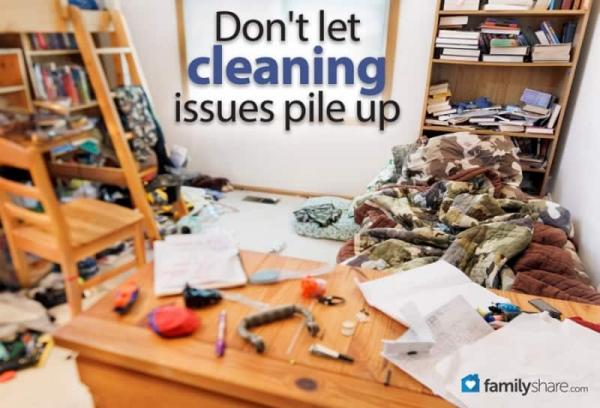
Aunt Marge (the queen of the white glove test) is coming for a week and will be staying in Suzy's room. You know the one with clothes strewn about, books and papers underneath the pillows and (although you can't confirm it) a pile of clothes that has some creature living inside of it. Rather than run around with a snow shovel and a trash bag, there are ways to take care of the situation and build good housekeeping habits.
Set clear and age appropriate expectations
Beginning in toddlerhood, model the behavior that you expect when cleaning up toys. Your child will assume more responsibility as they mature, but working with a toddler to pick up his toys (and praising his work) will establish a family culture of working together so that your child will see the value in work and have warm memories of working together with you.
Show your child what you expect from the very beginning in a meaningful way
You've probably been in a situation that required you to do something that you did not know what was expected at the end. This is frustrating for adults, and simply telling your child, "Go clean your room,"� can be an equally frustrating experience for your child. Always work with your child to establish your expectations ahead of time. For a younger child, take digital pictures of the different areas of her room and the way these areas should look when clean. Post them on a poster or the wall so that your child knows exactly what is expected. For older children, make a simple checklist for her to track her progress. This allows her to be able to monitor her own work and see a sense of accomplishment.
Model the behavior that you want your children to master
Honesty time - are you practicing what you preach? Does your child have a rule that he must make his bed every day and yours remains unmade? Your child will quickly pick up on this behavior and will not be as likely to cooperate with you when you ask him to clean up. You will lose the respect of your child quickly if you behave hypocritically in any area of parenting. If you have been modeling some behavior that you want to change in your family, begin by addressing it by yourself for several days before bringing it to your child's attention. Acknowledge your shortcomings (don't make excuses) with your child. This will show him that you are fair, honest and willing to admit when you have made a mistake, and will go a long way in showing her how to handle different circumstances.
Talk about the rules in a calm fashion and as a family
When you set up a new routine for housekeeping, make sure that each member of the family knows what is going to be expected of them, and do so in a calm and peaceful environment. Yelling and nagging your kids to do better will build resentment and resistance. Praise your children's individual efforts. Make a goal to have every member of the family do better (even if there is but one member of the family that is messy) to keep the family home neater and cleaner. In this way, the members of the family who are struggling with their disorganization do not feel singled out and will be open to cooperation.

